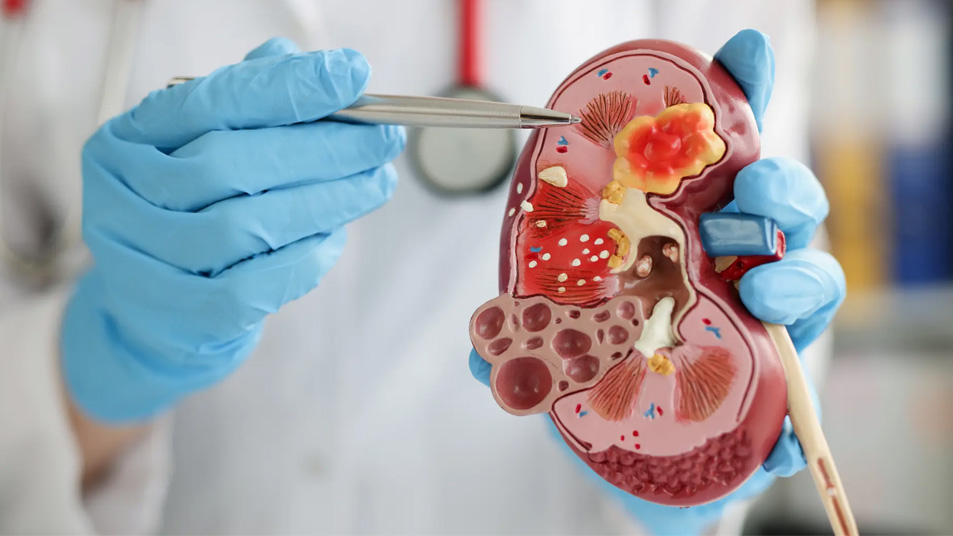
A) What is kidney stone surgery ?
Kidney stone surgery is a medical procedure aimed at removing stones
that form in the kidneys and can cause significant pain, urinary
obstruction and other complications. The surgery is typically
recommended when stones are too large to pass naturally or when they
lead to severe symptoms such as recurrent urinary tract infections,
persistent pain or kidney damage. There are several surgical techniques
employed to treat kidney stones, with the choice depending on the size,
location and composition of the stones.
Aparant Hospital in Chiplun is renowned for its comprehensive approach
to kidney stone treatment, offering a full spectrum of care to patients.
The hospital features advanced diagnostic facilities including imaging
and laboratory services, to accurately assess the size and location of
kidney stones. Their expert urologists specialize in various treatment
options, from conservative management and medication to minimally
invasive procedures like Extracorporeal Shock Wave Lithotripsy (ESWL)
and Ureteroscopy. For larger stones or complex cases, Percutaneous
Nephrolithotomy (PCNL) is performed by skilled surgeons using
advanced technology. With a dedicated team and a patient-centric
approach, Aparant Hospital ensures effective and compassionate care
for individuals suffering from kidney stones.
B) Causes of Kidney Stones :
Kidney stones develop when specific substances in the urine become
overly concentrated, causing crystals to form and grow into stones. The
primary causes include :
1. Dehydration : Inadequate fluid consumption results in concentrated
urine, which raises the risk of kidney stone development.
2. Diet : High intake of oxalate rich foods such as spinach and nuts,
excessive salt and high protein consumption can contribute to the
development of stones.
3. Obesity : Increased body weight can change the acid composition of
urine, promoting stone formation.
4. Medical Conditions : Conditions such as diabetes, hyperparathyroidism
and urinary tract infections can increase the risk of kidney stones.
5. Family History : A genetic predisposition can make individuals more
susceptible to developing stones.
6. Certain Medications : Some medications such as diuretics and calcium
based antacids, can contribute to stone formation.
C) Pre-Surgical Evaluation :
Before undergoing kidney stone surgery, a thorough pre-surgical
evaluation is essential to ensure patient safety and optimize outcomes.
This evaluation typically includes following process :
1. Medical History Review : The surgeon will assess the medical history of the patients such as, previous episodes of kidney stones, existing health
conditions and medications.
2. Physical Examination : A comprehensive physical examination helps
identify any underlying issues that might affect the surgery.
3. Imaging Studies : Imaging techniques such as X-rays, ultrasounds or CT
scans are used to determine the size, location and composition of the
stones.
4. Urinalysis : A urine sample is analyzed to detect signs of infection,
blood or other abnormalities that could complicate surgery.
5. Blood Tests : Blood work is conducted to check kidney function and
electrolyte levels which can provide insight into the overall health of the
patient.
6. Anesthesia Assessment : An evaluation by an anesthesiologist ensures
that the patient is fit for anesthesia and helps plan appropriate
anesthesia techniques for the surgery.
D) Surgical Treatment Options :
1. Conservative Management : Involves increased fluid intake and pain
management for smaller stones that may pass naturally.
2. Extracorporeal Shock Wave Lithotripsy (ESWL) : A non-invasive
procedure that uses shock waves to break kidney stones into smaller
fragments for easier passage.
3. Ureteroscopy : A minimally invasive technique where a ureteroscope is
used to directly visualize and remove stones from the ureter.
4. Percutaneous Nephrolithotomy (PCNL) : A surgical procedure that
accesses the kidney through a small incision in the back to remove larger
stones.
5. Medications : Prescribed drugs that help manage pain, reduce stone
formation or facilitate the passage of smaller stones.
6. Dietary Modifications : Adjustments in diet such as reducing salt and
oxalate intake, to help prevent the formation of new stones.
7. Surgical Options : More invasive procedures may be necessary when
other treatments fail or when stones cause significant complications.
8. Follow-up and Monitoring : Regular check ups to monitor kidney
function and detect any new stone formation for timely intervention.
E) Frequently Asked Questions (FAQs) :
1) What are the symptoms of kidney stones?
A.) Symptoms include severe pain in the back or side, blood in urine,
nausea, vomiting and frequent urination.
2) How are kidney stones diagnosed?
A.) Kidney stones are diagnosed through imaging tests such as X-rays,
ultrasounds or CT scans, along with urinalysis.
3) What are the available treatments for kidney stones ?
A.) Treatment options include conservative management, ESWL,
ureteroscopy, PCNL and dietary modifications at Aparant Hospital.
4) How can I prevent kidney stones from forming again?
A.) Preventing kidney stones involves staying hydrated, making dietary
changes and following the recommendations of your doctor.
5) Why choose Aparant Hospital for kidney stone surgery?
A.) Aparant Hospital offers advanced technology, experienced
specialists and comprehensive care for effective kidney stone
treatment.
